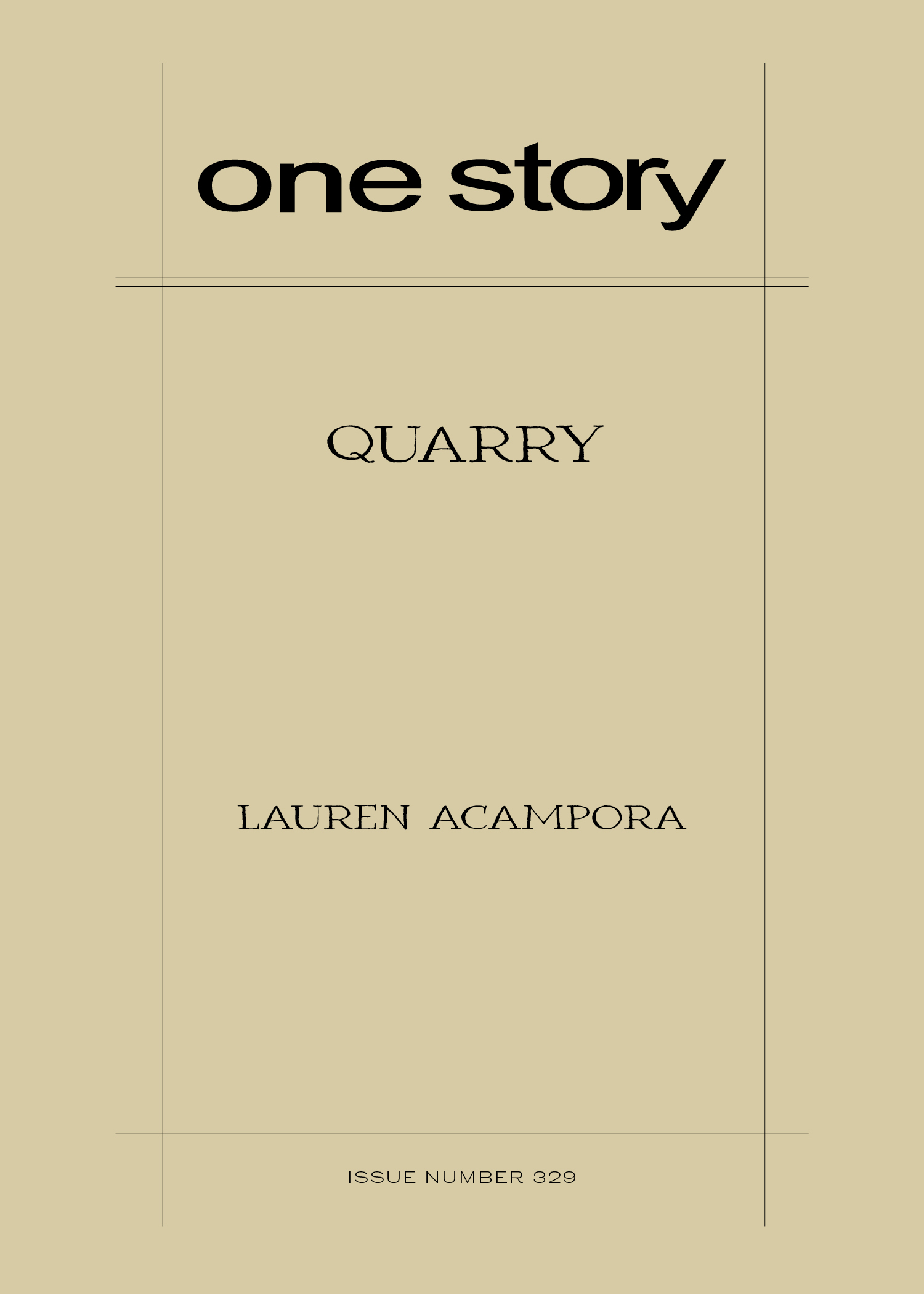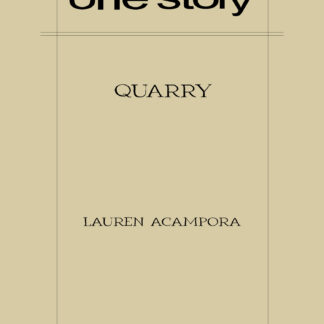
Quarry
$2.50
73 in stock
Excerpt
A soft September Saturday. Riesling, zinnias, air kisses. Harold and Carol Christensen, esteemed elder guests, in deep shades of blue. Bill and Lina Gregory, vibrant hosts of Minuteman Road, fresh from safari in earth tones. Dinner in the four-season room: a clean cube of glass ringed by emerald lawn, privacy trees in full autumn leaf.
There’d be no hired chef tonight. The Gregorys were going rogue, preparing dinner themselves, taking a crack at something completely different, if the Christensens would indulge them—a braai, a kind of barbecue they’d had at the safari lodge. They’d pair the meal with South African red but also open the Christensens’ white, of course, which looked sublime. It was lucky the Gregorys had visited the vineyards after the safari portion of their journey. They’d bought no fewer than six bottles of red to bring home, too weak to resist, and would never have been allowed to put all that weight on the little puddle-jumper plane from Cape Town to the preserve.
Oh my God, that little plane! That might have been the most frightened Lina Gregory had been on the whole trip. Carol Christensen said she completely understood, she wouldn’t board one of those dinky planes if you paid her, they always made her think of poor JFK Jr. and his wife. She and Harold had been on the Vineyard the same weekend it happened, you know, and remember how the wife’s poor sister had gone down, too? For some reason, that was the saddest part of all.
Lauren Acampora
Lauren Acampora is the author of four books of fiction: The Wonder Garden, The Paper Wasp, The Hundred Waters, and The Animal Room, a forthcoming collection of linked stories of which “Quarry” is a part. Lauren’s work has won or been nominated for the GLCA New Writers Award, the Center for Fiction’s First Novel Prize, the Story Prize, and the New England Book Award, and she’s been named an Artist Fellow in Fiction by The New York Foundation for the Arts. Her writing has appeared in publications such as The Paris Review, New England Review, Missouri Review, Guernica, and The New York Times, and will be anthologized in The Best American Short Stories 2025.
Patrick Ryan on “Quarry”
Lauren Acampora’s “Quarry” involves a dinner conversation between two couples seated at a table in a glass box of a room, surrounded by a well-manicured lawn. The Gregorys—the dinner hosts—are just back from safari. The Christensens—their guests—want to hear all about it.
What unfolds is a fascinating, sometimes wince-inducing conversation that reveals as much about the Gregorys and their efforts to place themselves in the world as it does their trip. The deeper they dive, the more they—and the Christensens—paint a complex and troubling portrait of both themselves and the tourism industry.
One of the many things I admire about this story is that glass box of a room the characters are sitting in. It’s hardly mentioned, but it enhances the reader’s sense of listening-in and observing—being a voyeur, in other words—but from a certain remove. In fact, it’s the characters who are the creatures being peered at here; the reader is on safari. Lauren Acampora makes for an excellent guide, and we were glad to follow her on this expedition. We hope you are too.
Q&A by Patrick Ryan
- PR: Where did you get the idea for this story?
- LA: I always wanted to write a collection of stories inspired by human/animal dynamics, something that’s fascinated me forever. For years, I gathered ideas for these stories, including one about safaris. I find the idea of safari so interesting, so complicated: this apotheosis of elite experiential travel with a whole sprawling industry connected to it, and entire economies dependent upon it. It touches on very particular ethical questions that spiral out into bigger questions about responsible travel, conservation, systemic structures, and human nature. Although I’ve never been on a safari myself, I’ve talked with people who have, and I’m always struck by the breathless exhilaration of these trip reports, the attempt to convey the extraordinary experience of being so near to these wild, majestic creatures in a faraway foreign place. Since safari was not in my own family budget, I learned all I could from home, reading guidebooks, safari guide memoirs, and many, many (highly entertaining) lodge reviews on TripAdvisor. It finally occurred to me to just write the story as a trip report, unspooling the impressions and takeaways of the kinds of people fortunate enough to go. While researching, I kept an ear to the ground for the vibrations of a story. Eventually I came upon a terrific podcast called “The Invisible Hand,” about rhinoceros poaching in South Africa and its manifold social implications, and the story broke open for me.
- PR: How long did it take you to finish a draft you were happy with?
- LA: Oh boy. Well, I just searched my computer for the first scratchings of the story, and apparently that document was created in 2019. That’s not to say it took six years to write, but I guess I jotted notes and messed around with it for quite a while.
- PR: The dialogue is rendered without quotation marks and is often reported by the narrator. What brought you to write it this way?
- LA: “Quarry” is the only story I’ve written this way. Because I wanted it to read as a straight trip report, I needed to maintain a great deal of narrative distance. Quotation marks were making it feel too much like a stage play, so I got rid of them and just let the dialogue slip in and out of summary in a kind of detached, journalistic way.
- PR: One of my favorite things that fiction can do is put the reader into the perspective of unpleasant (if not awful) people and observe them not realizing how unpleasant (if not awful) they are. Hats off to you for a piercing example of that. When you wrote about these characters, did you feel like you were able to empathize with them? Or did you feel mostly disdain? Did you want to empathize? (And should we?)
- LA:
I absolutely empathize with them. Who among us really knows how we come across? Most of us don’t think of ourselves as unpleasant or awful, at least not usually. I’m someone who loves travel and solicits other people’s trip reports. But when reporting on a trip, it’s almost impossible to not sound like a jackass. Travel is by nature about acquisition and display—of experiential, if not material plunder. I’m sharply aware of how superficial these little visits really are, and that the scraps of glittering loot we bring back to share have been curated and sanitized—although I cherish them all the same. There’s a kind of innocence in travel, an obliviousness that’s hard to avoid, even with all the planning and research in the world. Does this make travel bad? I don’t think so. But it’s easy to fall into a trap of self-congratulation, to not realize how limited our view—as outsiders but also as individuals with built-in limitations—really is.
I wanted to show the limitations of the characters in “Quarry.” They are both self-congratulatory and genuinely well-intentioned. Because, on the face of it, what have they really done wrong? They really did try to travel responsibly! They chose to explore an unfamiliar place adventurously but safely. They spent money in an economy that welcomes tourist dollars. They were generous to local people in the township. They learned about an urgent conservation issue—as it was framed for them—and were moved to support it. They truly did widen their experience of the world. But they also missed a lot. They didn’t stay long enough or dig deep enough to glimpse the history and social complexities behind the poaching emergency. The poverty and desperation of the poachers, the scramble for dignity and equality, weren’t highlighted for them, and so they remained blindered, their biases going unexamined—even concretizing, in a sad irony.
Like all of us, they are products of their own backgrounds and experiences and are ultimately only able to absorb and understand the world through those filters. So, their oblivious sanctimony back in their luxurious home, and the fawning validation from their friends, is cringeworthy. And whether the trip will prove “life-changing” for them in any concrete way is questionable. But I think all of us are sometimes guilty of such well-meaning complacency. How many of us make vows to change our lives after experiencing something inspirational or extraordinary, and then…don’t?
- PR: What are you currently working on?
- LA: I’m happy to say that the collection that “Quarry” is a part of, The Animal Room, is set to come out in June 2026. It features some characters from my previous books, like the Gregorys and Christensens originally from The Wonder Garden. Meanwhile, I have ideas for three new books and have to choose one... I’ve been doodling notes on one of these ideas for probably a decade; I’m afraid to even look at the origin date of that Word doc.
- PR: What’s the best piece of writing advice you’ve ever received?
- LA: Keep your butt in the chair.
